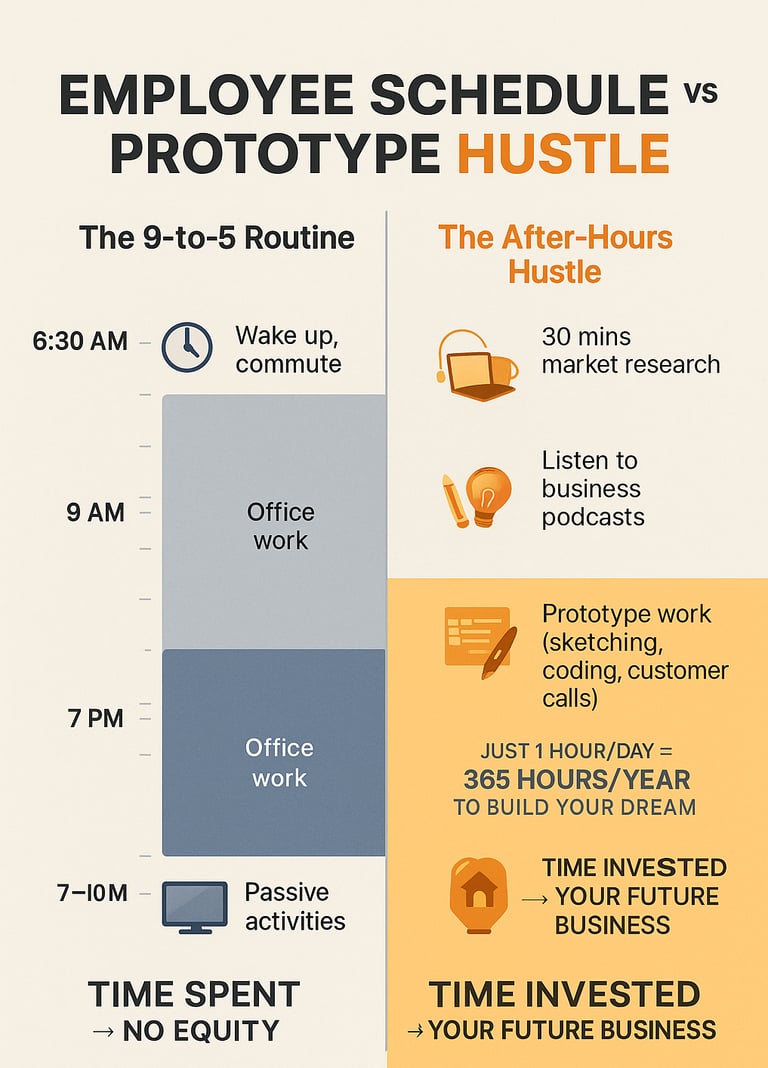Cover Story
For Business
How to Build Your Business Prototype or micro model While Still Employed
Your First Step Toward Becoming a Full-Time Entrepreneur
By Hanif Lakdawala | For Business
I
How to Build Your Business Prototype or micro model While Still Employed
Your First Step Toward Becoming a Full-Time Entrepreneur
By Hanif Lakdawala | For Business Magazine
The Rise of the Side-Hustle Entrepreneur
The entrepreneurial landscape is no longer defined by high-stakes, all-or-nothing gambles. A growing number of individuals are turning to a more strategic, less risky approach: building a business prototype or "micro-model" while still employed. This strategy allows for market validation and revenue generation without the immediate pressure of replacing a full-time salary.
Key Statistics:
A significant portion of the workforce is actively engaged in side projects. Recent surveys have shown that a substantial percentage of adults in countries like the U.S. have a side hustle, with some reports putting the number as high as 45%. This trend is particularly strong among younger generations, with Gen Z and Millennials leading the charge.
The financial impact is real, but often supplemental at first. While some high-earning side hustlers can bring in over Rs 1,00,000 a month, the median monthly income for many is often much lower, sometimes under Rs 25000. This highlights that the initial goal is often to supplement income, pay down debt, or save for future investments rather than to immediately replace a primary salary.
A "lean startup" mentality is crucial. The global side-hustle economy is massive, demonstrating a widespread interest in starting small. Many successful businesses began as micro-models, or Minimum Viable Products (MVPs), which focus on a core feature to test market reception before a full-scale launch. This approach helps to avoid the number one reason startups fail: a lack of market need.
Why Wait for the “Perfect Time”?
Build a Business Prototype Now.
Thousands of professionals dream of quitting their jobs and starting their own business—but fear, risk, and lack of clarity hold them back.
The solution? Don’t quit first. Prototype first.
Before risking your income, test your idea in the real world with a micro model. Think of it as your business in miniature: low cost, low risk, high learning.
Why Start with a Prototype or Micro Model?
A prototype is an early, functional version of a product or service designed to test its viability, gather feedback, and identify flaws before a full-scale launch. A micro model, on the other hand, is a small-scale business—often with fewer than 10 employees and minimal initial investment—that targets a specific niche or community. Both approaches reduce risk and provide critical insights for entrepreneurs.
Purpose of a micro model
Validate the market
Get actual feedback from customers
Identify pricing, delivery & demand patterns
Build confidence and proof of concept
“You don’t need a co-founder, a pitch deck, or an office.
You need 3 paying customers and a weekend.”
— Inspired by Lean Startup methodology
What the Research Tells Us
82% of successful entrepreneurs tested a business idea while still employed.
(LinkedIn Career Transitions Survey, 2023)Startups that launch a Minimum Viable Product (MVP) are 3.5 times more likely to attract investment.
(Harvard Business Review, 2022)In India, over 70% of profitable startups began as informal side hustles or micro businesses.
(Startup India Trends Report, 2023)
5-Step Playbook to Launch Your Prototype
Define a focused version of your idea
What can you offer this weekend with minimal tools?Choose a delivery tool
WhatsApp, Google Forms, Wix, Shopify, or Instagram—it doesn't have to be fancy.Get 10–30 real people to try it
Friends, family, ex-colleagues—sell it, don’t just show it.Refine from feedback
Change the messaging, pricing, packaging, delivery based on reactions.Repeat until something clicks
When the same people come back or refer others—you’re onto something.
Why Micro-Models Win: Trends Fuelling the Shift
Tech Democratization: AI tools (Canva, ChatGPT) reduce startup costs by 80% 811.
Consumer Preferences: 80% of buyers choose brands offering personalized experiences—micro-ventures dominate here
Investor Shift: VCs now scout Indie Hackers communities; 28% of funded startups began as side projects
Why This Matters Before You Resign
A prototype teaches you:
What people are actually willing to pay for
What you're uniquely good at delivering
How much time, effort, and capital it actually takes
Whether this business can replace (or surpass) your job income
According to Startup Genome, premature scaling is the #1 reason why startups fail. Prototyping prevents that.
From Side Hustle to Startup: Your Roadmap
Launch prototype
Validate income and product-market fit
Save 6–12 months of personal expenses
Quit your job strategically
Scale smart with data, not assumptions
Final Thought
You don’t need to be “ready.”
You don’t need funding.
You don’t need a 50-slide pitch deck.
You need a tiny version of your idea, a few people to test it, and a willingness to learn fast.
“Build small. Learn fast. Scale smart.”




Insights
Explore valuable resources for aspiring entrepreneurs today.
Connect
Support
info@forbusiness.co.in
© 2025. All rights reserved.
info@forbusiness.co.in
